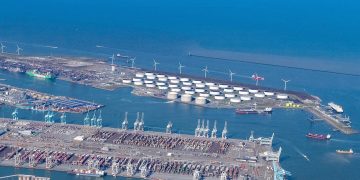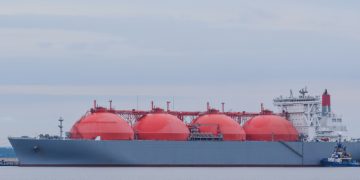The impact of the COVID-19 pandemic on the shipping industry is obvious, not only decreasing demand growth prospects for the year across all segments, but also affecting fleet development.
Following BIMCO’s 2020 forecast revision, Peter Sand, BIMCO’s Chief Shipping Analyst, commented that the coronavirus has replaced the long waited 2020 sulphur cap; The demand outlook has weakened and uncertainty has increased across the board.
He added that this combination is reflected in fleet developments this year. A weaker outlook results in less contracting and more demolition, although this too has been affected by the coronavirus due to restrictions around the world.
The contracting which was already decreased, prior to the COVID-19, has only worsen, as during the first quarter of 2020, contracting activity dropped 55% from the first quarter of 2019, with only 6.6 million deadweight tonnes (DWT) ordered across the three major shipping segments, down from 14.7 million DWT last year.
Uncertainty about future environmental regulations, as well as lower demand growth outlook in the coming years, already had many think twice before ordering a new ship. The very sharp decrease in market sentiment and global shipping demand has only lowered contracting activity further,
… Peter Sand commented.
In addition, the product tanker segment has experienced the slightest fall in new orders during Q1 in comparison to last, with orders down 17.8% to 806,500 DWT.
On the other hand, concerning the crude oil tanker side, contracting activity has halved from the first two months in 2019 (-53%) with new orders totalling 2 million DWT. Three VLCC orders have been recorded, with the remaining new orders being for Suezmax and Aframax ships.
Also, the dry bulk shipping has had the steepest drop, falling to 1.6 million DWT in the first quarter of this year, from 6.9 million DWT in Q1 2019.

Despite the decrease seen in contracting activity, many are the vessels sent foe demolition in the first quarter of the year. This was due to higher fuel prices and poor market conditions, which made it more attractive to scrap older ships rarther than to keep them sailing and losing money.
Demolitions in the first quarter of the year reached the 6.1 million DWT, increasing by 62% from Q1 2019.
Sands noted that the negative effect of COVID-19 in the industry means that many owners are now looking to have their ships demolished. Yet, with restrictions aimed at containing the virus spreading further around the world, finding demolition availability is becoming increasingly challenging.

All three of the major demolishing countries in the Indian sub-continent, namely Bangladesh, India and Pakistan, have announced the closure of their yards, and ships heading towards them will be denied entry. This will halt all scheduled activity for at least the next few weeks.
As demolition yards now close their doors, many owners of container and dry bulk ships will be left with unwanted tonnage in an already difficult situation. As long as freight rates hold up for tankers, owners will be less likely to scrap their ships, but even in this market, demand has evaporated and the current high freight rates are not sustainable.
Concerning the dry bulk segment, it has driven most of the demolition activity, with 5m DWT of capacity removed from the market in Q1 2020, of which 4.1 million DWT came from 21 Capesizes.
For a VLCC of 300,000 DWT, scrapping now brings in USD 13.6 million, which is USD 3.5 million less than sending the same ship to Bangladesh a year earlier.
Ultimately, the scrap value of the ship is not the driving factor behind the demolition decision. Instead, shipowners look to the prevailing market conditions and earning prospects of the ship,
… says Peter Sand.
A short term impact of the COVID-19 is the delays of newbuilt ships in China and across the Far East.
In February, there was only 398,712 DWT delivered by Chinese yards, a quarter of what was delivered in February 2019. Deliveries in March this year were half of those seen in March 2019. Currently, Chinese shipyards are delayed by between four to eight weeks.
In general, deliveries declined by 16.7% in the first quarter of this year compared to the same period last year. Contrary to the rest of the shipping markets, where deliveries have fallen compared to last year, the dry bulk market has had more deliveries in the first quarter of this year than last. A total of 12.9 million DWT was delivered in the first quarter, 3.9 million DWT more than Q1 deliveries last year.
Deliveries of dry bulk vessels accounted for 60% of the total 21.5 million DWT delivered in the first quarter the year.
Both segments of the tanker shipping industries have seen deliveries fall by just under half compared to the first quarter of 2019; -49% and -43% for crude oil and product tankers respectively. A total of 5.7 million DWT of crude oil tankers was delivered in the first quarter of the year, of which 4 million comes from the delivery of 13 VLCCs.
In the container shipping market, one ULCS has been delivered as well as three neo-panamax, while 14 feeder vessels between 1,162 and 2,806 TEU made up the rest of deliveries. In total deliveries were down 58.6% to 102,435 TEU combined, compared with the first quarter of last year.
Peter Sand concluded that
These new vessels are entering the market at a time of increasing uncertainty. Although new tankers are entering the market at a time whenfreight rates are high, given the prevailing market conditions, it is likely only a matter of time before they join the container and dry bulk ships in trying to navigate a struggling market.

























































